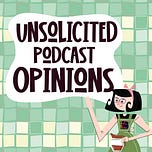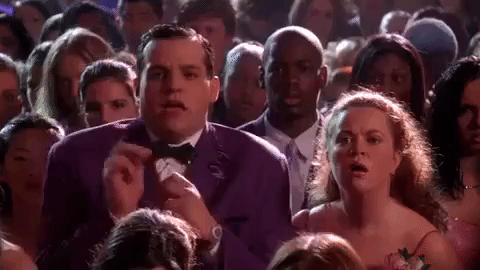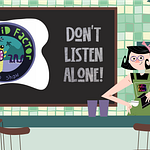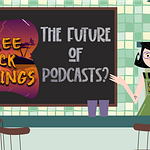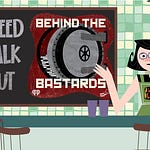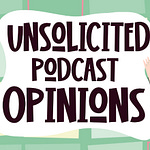Happy Friday, friends! I’m really excited to share this episode with you.
And frustrated, because there’s so much I wasn’t able to talk about. I feel like I’d need several more episodes to really unpack everything.
So, without further ado — well, one last ado.
Annotated Transcription
Hey there, friends!
I’m Katie Nolan, and this is Unsolicited Podcast Opinions, the show where you get more than my two cents: you get the whole damn dollar.
I’m an opinionated podcast nerd whose closest friends don’t listen to podcasts.
Making new friends? That’s hard. Making a podcast where I can channel all my thoughts and feelings? That’s not quite as hard.
I am so excited for today’s episode.
Like, I’m gonna have to struggle to keep everything coherent and not just bounce from thought to thought like a rabbit on a sugar high.
What’s the podcast? I’ll let narrator Steve Shell make the introductions.
Steve: Old Gods of Appalachia is a horror anthology podcast and therefore may contain material not suitable for all audiences. So listener discretion is advised.
The series weaves together standalone stories to paint a picture of an alternative Appalachia: one that’s filled with gods, monsters, tricksters, and magic.
Since it launched in 2019, Old Gods of Appalachia has won multiple awards, and was the first professional podcast to be nominated for a World Fantasy Award in 2022. It periodically has live shows that tour around the country, and they’re coming out with a tabletop roleplaying game that I am very, very excited to play.1
The series was co-created by Steve Shell and Cam Collins, both natives of Appalachia, and began its life as a side project, a fact which still blows my mind. Steve was a high school English teacher, and Cam a graphic designer and programmer. Four years later, it’s their full-time job.2 In a deeply heartfelt message at the end of Episode 50, Steve says to the audience:
Steve: We appreciate each and every one of you. You’ve given us brand new careers. You’ve taken what was a fun project and made it into a community. […] We can’t express adequately the things you’ve made possible for two people who honestly have kind of scraped by as a public school teacher and freelance software developer and website designer for years. You guys have let us make art for a living and we can’t thank you enough for that.
For me, Old Gods is a podcasting role model, both professionally and creatively. It’s a really inspiring example of creating a business that aligns with your values, and the stories it tells demonstrate just how powerful horror can be.
Let’s start with their business model.
Once upon a time, I wouldn’t have really cared about it. But as someone trying to find their place in the world (and a source of income) after leaving big corporate media… let’s just say it’s extremely relevant to my current interests.
Old Gods of Appalachia isn’t backed by any major industry player: it’s not funded by Spotify; it’s not an Apple Original; it’s not by Audible or iHeart. It is wholly owned by Steve and Cam’s company, DeepNerd Media.
From what I can tell, they’ve relied on their community of listeners for funding right from the beginning. Patreon has always been a core part of their business model, and they also use other listener-focused revenue streams, like merch sales and live shows.
They didn’t start running ads until 2021, when they joined the Rusty Quill Podcast Network.3 Rusty Quill now handles their distribution and ad sales.4
CORRECTION: In the episode, I say that ads are clearly where the real money is. I’ve since been informed by the Old Gods team that ads only make up 1% of their income and the vast majority of their income comes from Patreon.
Ads are clearly where the real money is.
Once they joined Rusty Quill, Steve and Cam were able to make Old Gods their full-time job. I don’t think they could have done that on Patreon and merch sales alone.
But their relationship with their audience is still the core of their monetization strategy. Unlike a larger company (cough iHeart Media cough), Rusty Quill knows the Old Gods audience. They aren’t going to offer garbage ads for gold investment scams.
Side note:
It is WILD to me that Behind the Bastards is a huge success for iHeart Media and yet iHeart still doesn’t bother tailoring ad sales to the podcast’s audience. You’re seriously going to air a recruitment ad for the Washington State Highway Patrol on a podcast where the entire production team are openly police abolitionists? Like, REALLY?!
Anyway.
My point is, Old Gods hasn’t had to chase big corporate money to be financially successful.
Now, I don’t know if they’re bringing in enough money to buy a house or pay for a college education, but it’s enough to sustain themselves, a rotating cast of actors, AND pay for cultural sensitivity consultants – which is what I find most exciting and inspiring.
In their season two Q&A retrospective episode, they shared why they wanted to hire cultural sensitivity consultants:
Steve: Appalachia, while not, like, openly diverse, has a lot of stories that don’t get told and we wanted to tell those, but we also wanted to stay in our lane culturally. […] I can tell the story of Black miners murdered by a mining company, but I can’t point-of-view write from, like, a young Black miner coming to Appalachia, writing about what that’s like. I have no idea what it’s like, writing as a person of color. I’m a white cis dude who grew up in Appalachia with every golden ticket I could have punched.
Cam also shared a story of how they made the show so much better with just small attention to detail. I’ve edited the soundbite a bit for clarity.
Cam: There’s a scene where Melvin first meets the Underwoods, and Mrs. Underwood’s daughter is like, “Do you know who that is? That is my mother.” And when we had originally written it, we had written “that’s my mama,” and they kind of walked us through it and explained, you know, this is the matriarch, this is the head of this family, someone she treats with the utmost respect, and she’s talking to a stranger – not just a stranger, but a white stranger. She’s not gonna say “my mama,” she’s going to say “my mother.”
Tiny details like this may seem inconsequential if you’re from the privileged group – and certainly I, as a white person, can’t speak to the Black experience or how Black people might react to the story – but for me, in my experience as a white queer person, these kind of tiny details mean the world. They’re a sign that the creators know that I am here and are actively welcoming me into the world they’ve made.
I’ve advocated for having cultural sensitivity consultants to past employers and have had that idea shut down. When your guiding principle is profit, you’re always looking to cut costs.
But Steve and Cam, because they’re working for themselves, they are empowered to make financial decisions that are in line with their values.
Steve: Nobody does emotional labor for this show without being compensated.
None of us can really opt out of the capitalist system, but I love seeing people find ways to carve out little corners of independence. And honestly…
I am not at all surprised that the best example of this independence that I’ve seen comes out of Appalachia.
The region has a long history of fighting corporate exploitation. I mean, 10,000 miners in West Virginia led an uprising in 1921 that was practically a second Civil War.5 And the Old Gods creators are quite open about how Appalachian history has shaped them, the stories they tell, and the very nature of The Old Gods of Appalachia series. Here’s a clip from the show prologue:
Cam: We grew up in the shadow of these mountains, and the shadowy industries that continue to exploit and pillage a land and people who offer themselves up again and again as sacrifice.
Steve: We have seen the shadows stir. We have heard the calls in the night and this podcast is our attempt to answer them, and to make sense of where we come from in the telling of these tales.
Horror is the perfect vehicle for that kind of exploration.
There’s an entire academic field called “monster theory,” which studies the role monsters and horror play in society. According to Professor Liz Gloyn at the University of London, “Monster theory argues that monsters come into existence in order to help society articulate fears and concerns about people not belonging to the dominant group. [...] What looking at monsters that map on to different groups of people really tells us is what kind of threat they are supposed to hold.”6
In many stories, the monster is a threat to the status quo. Things are fine until the monster arrives. In The Conjuring films, for example, families are happy until their homes are invaded by demons. In It Follows, the main character Jay’s life is happy until she has sex with her new boyfriend, which makes her the target of a relentless shape-changing monster.
Old Gods of Appalachia is different.
It’s part of a subgenre known as “eldritch horror” – also known as “cosmic” or “Lovecraftian” horror, after the famous author (and flagrant racist) H.P. Lovecraft.
Marie Enger, author of Where Black Stars Rise, describes eldritch horror this way: “It's nature, and we're all really afraid of nature because nature doesn't care about us and can kill us at any time. The cosmic stuff is the forces we can't control – madness, a higher power that is uncaring, and unfeeling.”7 End quote.
We can see this in the very root of the term “eldritch” – which, as I found out with a little bit of research, was NOT invented by Lovecraft, but actually comes from the Middle English word for “Fairyland.”8 And this makes a lot of sense! In most folklore around the world, fairies are kind of monstrous, completely alien to humanity, and Fairyland itself is a pretty horrifying place to be.
What Marie Enger implies – but I want to state more directly – is that in eldritch fiction, the horror is the status quo. It’s not an intrusion into your life; it’s a fundamental part of the world around you.
Old Gods uses several narrative tools to really drive that point home.
The stories are all set in the same world, the same alternative Appalachia. Even though they can stand on their own, the protagonists come up against various aspects of the same monstrous forces.
The stories also jump back and forth through time, a narrative feature that Steve and Cam are extremely proud of, as they explain in the intro to the Patreon-exclusive series, Black Mouthed Dog:
Steve and I take great pride in our nonlinear storytelling. The way our stories move back and forth in time to reveal family secrets, hidden motivations, and other dark mysteries is very intentional.
This approach has its pros and cons. It really does make the series feel appropriately mythic in scope, and avoid the feeling that we’re following a linear path to the defeat of all evil, so it is really cool.
But it also confused the hell out of me as a first-time listener binging the entire series. It quickly builds up a huge cast of characters that I had a very hard time keeping track of, especially since my listening retention isn’t great. (I love audio, but I have to listen to things multiple times in order to remember anything from it.)
However, if you do take the time to relisten, you are richly rewarded. I listened to the entire series several times over in preparation for this episode, and the emotional impact of each story increased with every listen, as I better understood who the characters are, how they’re connected, and picked up on new details due to the nonlinear storytelling that I had missed in previous listens.
I also developed a much deeper appreciation for its themes.
Now Old Gods of Appalachia is about as subtle as a sledgehammer with its themes. Take this clip from the beginning of Episode 42:
Steve: Appalachia is a land that has seen centuries of suffering, all caused in one way or another by men. She has borne witness to some of the worst crimes that men in positions of authority inflict on those without the power to oppose them… and then there are the everyday evils that average folks who generally think of themselves as good people carry out every day: acts of bigotry and greed, pettiness and mean-spiritedness. And the folks on the receiving end of these injustices, both great and small, tend to be those who have been pushed to the margins of our society: indigenous folks, black and brown folks, queer folks, folks who bodies and brains work a little bit differently than most.
It is a land where for far too long, too many people have struggled while those who could choose to do the right thing, to share the wealth they have amassed with those who sacrificed their youth and their bodies and their time to produce the goods that afford them their comfortable lives, look down upon them and… simply turn away.
So yeah, subtle it is not. But at the same time, the series is incredibly nuanced. Heads up, the rest of this is going to involve some minor spoilers.
In the mythology of Old Gods, there are two opposing forces: the Dark and the Green. The Dark is connected to corruption, greed, and the capitalist class, while the Green is connected to life, growth, the working classes, and those who have been historically disenfranchised.
Those are the primary colors that Old Gods uses to paint a vivid, complicated, and nuanced world – one that’s honestly too complex to unpack in a twenty-minute episode.
So for right now, I’m only to going to focus on a few specific characters and how they relate to the theme of class conflict.
Old Gods of Appalachia is the only work of art I’ve encountered so far that I feel really captures the nuances of American class conflict.
Members of the Barrow and Locke families are recurring villains throughout the various stories. They are the robber barons of yore, controlling people’s lives with their heinous wealth and with Dark magic. They are served by creatures called “Hollow Men” – men who have been stripped of their souls and given the power to do unimaginable violence on B&L’s behalf. They are ungodly monstrosities who don’t care whose lives they destroy in order to get what they want.
I don’t know about y’all, but it’s hard for me to really wrap my mind around the wealth that people like Jeff Bezos or Mark Zuckerberg or Elon Musk have. The divide between us is so wide, it’s just incomprehensible to me. So in a weird way, the existence of magic and the monstrosity of Barrow and Locke help make that divide tangible, comprehensible, for me.
And as someone who prefers to look at issues through a systemic lens, I love that Old Gods doesn’t settle for implicating individual evils. It also takes abstract social forces and makes them tangible, most notably through the Man From the Railroad.
The Man From the Railroad has no name. He’s not a representative from any particular company or railway. He speaks of progress – every onward, ever forward – while mercilessly – and a little gleefully – destroying lives.
He represents the dark side of technological progress. In the episode “A Bad Night for Hollow Men,” two of the Hollow Men have a vision when they look into the Man From the Railroad’s eyes.
Man From the Railroad: Ah ah ah, that would be a very bad idea, my friend. Look at me. See me.
Narrator: Erskin and White did look, and they did see. What they saw would’ve stopped their hearts if they’d still been beating, would’ve baptised them anew in darkness if baptism could wash away what was already inside them. They saw the land split by iron tongues. They saw men worked to pulp driving spikes and laying rail. They saw the avarice and greed and the ever-growing power of the railroad in this man’s eyes.
Man From the Railroad: We understand each other now, yes?
Narrator: The two monsters dressed for the moment as men nodded dumbly.
(Another side note, but god, I fucking love the sound design in this show. It is hands down the best sound design I have ever heard. God, I wish I had time to go into it, but I don’t, so… put a pin in that, maybe I’ll come back to this series later. Anyway.)
B&L (Barrow and Locke) and the Man From the Railroad are eldritch horrors. They can’t be defeated; they can only be delayed.
It sounds depressing, but the series is far from bleak.
And I’m going to set this up with a short rant about Marvel movies, because I’ve got feelings.
In every single fucking Marvel movie I’ve seen, the stakes are exactly the same. The world is in danger or, if they’re feeling really spicy, the universe is in danger. Reality itself is in danger! Individual characters may have their own issues, but those issues only matter because they get in the way of saving the world.
This was the big problem I had with Shang-Chi and the Legend of the Ten Rings. You had this beautiful conflict about, you know, grief, and the relationship between father and children, and all of that gets resolved quickly – before the climax – because what actually mattered was saving the universe from monsters and not this beautiful story they had been telling up to that point. Makes me so mad.
Anyway.
This severely limits the way Marvel stories can end. The heroes either save the day, or they don’t. Or they save the day in the next fucking movie.
Old Gods of Appalachia focuses on individual, human stories. Will Sarah Avery escape the monsters hunting her? Will Daughter Dooley escape the trap Horned Head set for her? Can Tommy Adkins escape his monstrous employer and reunite with his fiancee?
They aren’t stories about destroying the enemy; they’re stories about surviving when the odds are stacked against you. And not just surviving, but thriving, even in a hostile world.
The Underwoods are probably my favorite example of this. They’re a family of African American landowners who are deeply connected to the Green and have powerful magic. The KKK burns down their house, only to find it mysteriously undamaged in the light of day. B&L tries to kill them all for their involvement in union organizing, but instead lose an incredibly valuable weapon. I just – I love them.
Old Gods is a series that understands the revolutionary importance of simply being alive, and where the most important power is the ability to keep people safe. Its protagonists are sex workers with the power to protect each other from male violence, women who use both magic and legal knowledge to help people escape domestic abuse. The strongest magic is rooted in community and connection.
It’s a horror series that, in a weird way, makes me feel safe and powerful. I may not have magic, but I do have community. I will never have to face the Dark alone.
If you’re interested in Old Gods of Appalachia, I recommend starting from the beginning.
That’s the way Steve and Cam designed the series to be consumed.
However, if you’re not a fan of horror but still want to give the series a try, I recommend starting with the episode “School Spirit,” which stands kind of completely apart from the timeline. You get a complete story in a single episode, and it’s a great example of how the creators use horror to explore themes. It should particularly resonate with anyone who lived through the Satanic Panic.
If you like this episode, you’ll probably like the entire series.
You could also try listening to “Salt of the Earth,” which does take place in the main timeline, so to speak, but it is another single-episode story which explores the complexities of the relationship between labor and capital with bone-chilling horror.
Now, I hope you don’t mind me asking:
Have you subscribed to this podcast? By which I mean Unsolicited Podcast Opinions? You won’t find podcast hot takes and critical analysis like this anywhere else, and they’ll be delivered straight to your podcast player of choice.
And if you opt for a paid subscription, you’ll also get exclusive behind-the-scenes content, even more opinions, and – most importantly of all – the warm fuzzy glow that comes from supporting a queer disabled artist trying to make their way through the world. Just go to unsolicitedpod.com.
Share your own opinions by following unsolicitedpodcastopinions on Instagram or emailing me at katie@unsolicitedpod.com.
Unsolicited Podcast Opinions is a twisted, unholy production of Katie Nolan Studio.
It’s executive produced by the beacon of light and joy known as Alicia Green. Say hi, Alicia!
Alicia: Hello!
Take care of yourselves, friends.
Article about the Battle of Blair Mountain (There’s also a Behind the Bastards episode about it) and NPS article about the West Virginia Mine Wars


